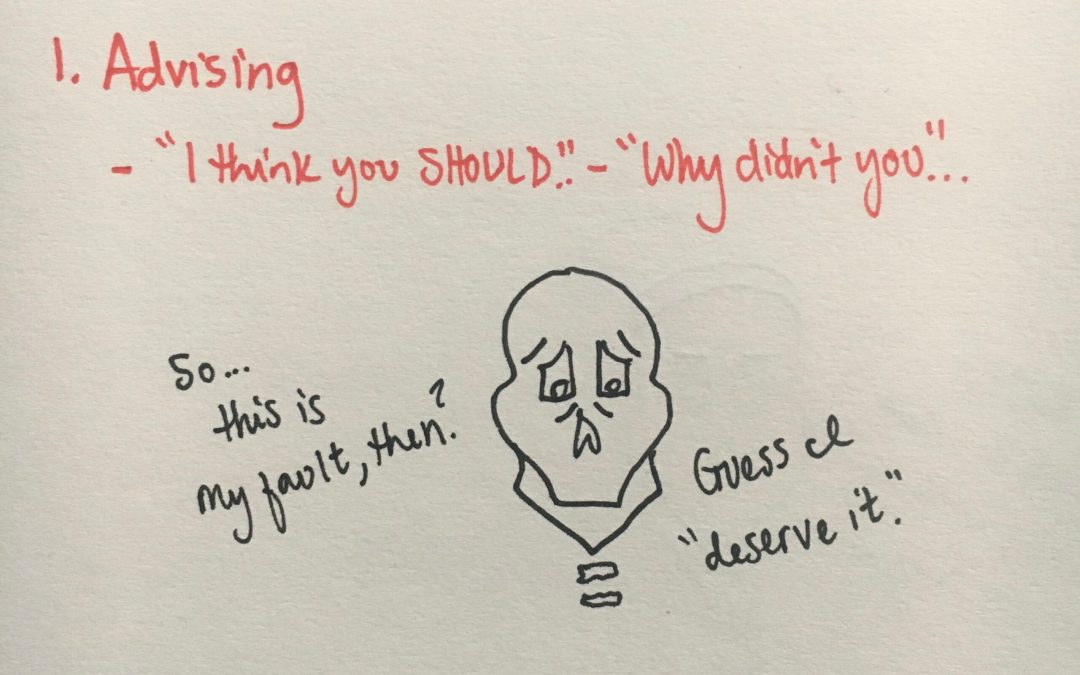I have more to say than the last episode suggested. Why are t-perspectives wrongly sized? How do parental egos...
Posts Tagged "family dynamics"

traumafamily holidays and the epiphany of ENOUGH
It's that time. Whether you're NC, LC, or BC (bitter contact), it helps to integrate evidence and recognize your...

Video+Transcript! No BS. How NOT to fuck your self up with the self-defense series
"I fucked up and I'm sorry." Let's talk about how NOT to use the self-defense episodes - which I fear I may have been...

Projective Identification (emotional enmeshment soup) | Video+Transcript
Short and snappy, let's talk about Projective Identification. It's more than "Projection," it's a clusterfuck of...

Projective Identification (emotional enmeshment soup)
Short and snappy, let's talk about Projective Identification. It's more than "Projection," it's a clusterfuck of...

Video+Transcript | self-Defenses Level 2: Major Image Distortions
In this episode, we delve into level two immature defenses, specifically major image distorting defenses. These psychological mechanisms protect individuals from anxiety by simplifying perceptions of self and others into all-good or all-bad categories. While these defenses may provide temporary relief, they often lead to negative consequences in relationships and can contribute to depression. Understanding these defense mechanisms can help individuals recognize patterns in themselves and others, potentially leading to more nuanced and healthier ways of processing emotions and experiences.

Video Version! Defense Mechanisms: Passive Aggression
"Concealed discharge of resentment / disappointment created by a lifetime of unmet needs." Let's talk about the depths...

Defense Mechanisms: Passive Aggression
"Concealed discharge of resentment / disappointment created by a lifetime of unmet needs." Let's talk about the depths...

PS – Intellectualism –> Shoulding all over yerself | Video+Transcript
Did I forget to say something yesterday, or plan to make this most important point separately? Intellectualizing ->...

4.1. Making of a Vulnerable Narcissist
This podcast episode explores the concept of vulnerable narcissism and its relationship to trauma recovery. It discusses how recovery resources like time, space, and energy can be misused, potentially leading to the development of narcissistic traits. The episode examines the characteristics of vulnerable narcissists, including their tendency towards negative time orientation and manipulative behaviors, and how these traits may stem from unresolved trauma.

3.11. Ten Destructive Responses that Set Off Trauma Defenses
This podcast episode explores ten destructive responses to avoid in sensitive conversations, based on NonViolent Communication principles. It discusses why people use these responses and their impact on relationships. The episode provides insights into improving communication skills, especially during stressful holiday interactions with family. It emphasizes the importance of empathy, active listening, and self-awareness in fostering healthier interpersonal dynamics.

2.12. Challenges of breaking the cycle | AKA – generational upset, NC, a new world
Explore the challenges and importance of breaking generational trauma cycles. Learn about family resistance to change, the impact on relationships, and the personal and societal benefits of trauma recovery. Understand the transmissibility of both trauma and healing, and discover strategies for maintaining recovery efforts despite opposition. Gain insights into the long-term effects of breaking trauma cycles on personal growth and future generations.

2.5. Entrapment, defeat, suicidality, and relationships | AKA – it’s not worth your whole life
Explore the concept of entrapment in relationships and its impact on trauma recovery. Learn about the challenges of leaving toxic relationships, dealing with self-doubt, and the potential link between entrapment and suicidal thoughts. Discover strategies for setting boundaries, changing relationship dynamics, and recognizing when it’s time to end a relationship. Gain insights into building self-capacity and autonomy after trauma.

2.4. Filial obligation and family re-immersion | AKA – the family system trap
Explore the complexities of family obligations and re-immersion for trauma survivors. Learn about the challenges of filial duty, the impact on mental health, and strategies for navigating family dynamics. Discover the importance of setting boundaries, self-reflection, and balancing personal well-being with family expectations. Gain insights into managing emotional triggers and maintaining progress in trauma recovery while dealing with family obligations.

2.3. “Perspective” | AKA – gaslighting, cognitive self-corruption, time distortions
Explore the role of perspective in trauma recovery and mental health. Learn how childhood experiences shape our perceptions and perspectives, and how these influence our adult lives. Understand the impact of family dynamics on perspective formation and the challenges of gaslighting. Discover strategies for self-validation and reframing trauma-related perspectives for healing and personal growth.

1.11. Fawning, Anxious Attachment, and Enmeshment
Explore the concept of fawning in Complex PTSD and its impact on relationships and self-worth. Learn about the characteristics of fawning behavior, its connection to anxious attachment, and how it originates in family dynamics. Understand the societal expectations that reinforce fawning and discover the importance of developing healthy boundaries in trauma recovery.